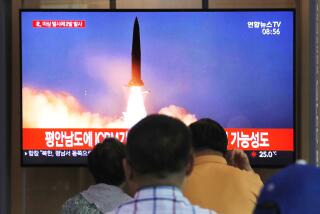Risks Studied in Atom-Powered Satellite Mishap
- Share via
WASHINGTON — The most probable space shuttle accident involving radioactive releases from plutonium-powered satellites on board could cause 202 cancer deaths and contaminate 367 square miles of land, according to a new government estimate.
The new Energy Department analysis, requested by Rep. Edward J. Markey (D-Mass.) and released Sunday, postulates greater damage than an initial report that was calculated differently and projected about 40 deaths.
The earlier report considered all wind directions and weather conditions and weighted them according to their probability at the time of an accident.
Most Probable Accident
The new report is based on risks posed by the most probable accident and the worst-case accident. The cancer figures were higher in both cases--202 in the most probable pre-launch scenario, 386 in the worst case.
The Energy Department said the cancer estimates are based on people staying in the launch area for a year, with no decontamination effort and no protective action taken by local officials.
With cleanup and protective measures, the actual added cancer death risk over 50 years to an individual near a launch-pad accident is one in 100 million in the first study and two in 100 million in the second, acting assistant energy secretary James Vaughan said in a letter to Markey. He said there is a 20% to 25% chance an individual will get cancer from other causes.
Plutonium Satellites
Before the Challenger accident, the National Aeronautics and Space Administration had planned to launch two plutonium-powered satellites this month from shuttle flights--the Ulysses last Thursday and the Galileo on Tuesday.
NASA now tentatively plans to launch the Galileo satellite in August, 1988, according to Jim Lombardo, director of the department’s division of special applications.
Markey, a member of the Energy and Commerce energy conservation subcommittee, which is investigating the risk posed by future shuttle missions’ carrying such satellites, said the government should not launch any nuclear missions until public health and safety can be assured.
More to Read
Sign up for Essential California
The most important California stories and recommendations in your inbox every morning.
You may occasionally receive promotional content from the Los Angeles Times.













